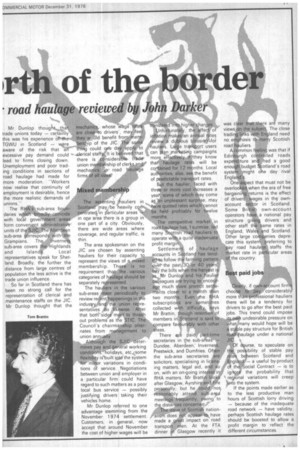rth of the bo
Page 29

If you've noticed an error in this article please click here to report it so we can fix it.
• road haulage reviewed b ,Joh.j Darker
Mr Dunlop thought that trade unions today — certainly this was his experience of the TGWU in Scotland — were aware of the risk that an excessive pay demand could lead to firms closing down_ Unemployment and poor trading conditions in sections of road haulage had made for more moderation. "Workers now realise that continuity of employment is desirable, hence the more realistic demands of unions."' The RHA's.. sub-area boundaries which broadly coincici, with local government are form convenient administrative units of the SJIC. The Aberdeen sub-area corresponds with :the Grampians. The InverneSS sub-area covers the Highlands and Islands. Local representatives speak for Shetland. Broadly, the further the distance from large centres of population the less active is the trade union influence.
So far in Scotland there has been no strong call for the representation of clerical and maintenance staffs on the JIC. Mr Dunlop thought that the mechanics, whose 'wage rMeS' are close to drivers', may feel they would benefit from membership of the JIC The same thing could one day apply to clerical staffs: It is believed that there is considerable trade' union membership of clerks and, mechanics in road haulage firms of all sizes.
Mixed membership The assenting 'hauliers in Scotland may be -heavily co .centratecL'in particular areas in one area there is a group in one part of a city. Obviously, there are wide areas where coverage, and regular traffic, is thin.
The area spokesman on the JIG are chosen by assenting hauliers for their capacity to represent the views of a mixed membership. There is no requirement that the various categories of haulage should be separately represented.
The hauliers in the various sub-areas meet periodically to review recent happenings in.:the industry, . and the union representatives do likewise. After that both sides meet to thrash out problems as the SM. The Council's chairmanship alternates from management to union annually.
Although the SJIC determines pay and general working conditions, holidays, etc,..some flexibility is built into the system for minor variations in conditions of service. Negotiations between union and employer in a particular firm could have regard to such matters as a poor local bus service — possibly justifying drivers taking their vehicles home.
Mr Dunlop referred to one advantage stemming from the November 1974 settlement. Customers, in general, now accept that around November the cost of higher wages will be inflation al rates review a us bessing for hauliers L.ie transport users can plan marketing campaigns more effectively if they know that haulage rates will be contained for 12 months Local authorities, also, see the benefit of predictable transport rates.
But the haulier, faced with three or more cost increases a year, some of which may come as an unpleasant surprise, may have quoted rates which cannot ;be held profitably fOr twelve months.
The competitive market in road haulage has, I surmise, led many Scottish road hauliers to operate with a quite inadequate profit margin:
Settlemerd of haulage accounts in Scotland has tended to follow the farming pattern over the past :30:or 40 years';'pay the bills when the harvest is in. Mr Dunlop and his haulier Colleagues are trying to encourage much more prompt settlements closer to a month than two months. Even the RHA subscriptions are sometimes collected with difficulty, says Mr Brattin, though retention,of members in,,Scotland is said to compare fa■Ourably with other areas. There ariaid part-time secretaries in the sub-areas -Dundee, Aberdeen, Inverness, Prestwick, and Dumfries. Often the sub-area secretaries are solicitors, specialising in licensing matters, legal aid, arid so on, with an on-going interest i RHA matters. Mr Brattin lookl after Glasgow, Ayrshire and fife personally, but he coulthrnott reasonably attend sub-area meetings frequently. owing to the distances concerneo.
The issue of Scottish nationalism does not appear to have made a great impact on road transport men At the ETA dinner in Glasgow recently it
was clear that there ar many views on the subject The close trading links with England need no emphasis to many Scottish road hauliers A common feeling was that if Edinburgh controlled roads expenditure and had a good enough budget Scotland's road systernmight one day rival England's.
One aspect that must not be overlooked when the era of free bargaining returns is the effect of drivers , wages in the ownaccount Sector in Scotland Some Britifiti own-account operators have a national pay structure giving drivers and other staff the same rates in England. Wales and Scotland Other large companies deprecate this system„ referring to pay road haula staffs the inarket rate in p ular areas
of the country.
Best paid job Clearly. if own-actount fir choose to pay considerably more than professional hauliers there will be a tendency for drivers to go after the best paid jobs. This trend could impose its °MI undesirable pressure on what many would hope will be a stable pay structure for British road haulage under a national JIC.
Of course, to speculate on the possibility of stable pay rates between Scotland and England -a useful by-product
of the Social Contract is to ignore the probability that regional variations will creep o the system.
If the points made earlier as to the less productive man hours of Scottish lorry driving -because of the inadequate road network -have validity, perhaps Scottish haulage rates should be boosted to allow a profit margin to reflect the different circumstances.




























































